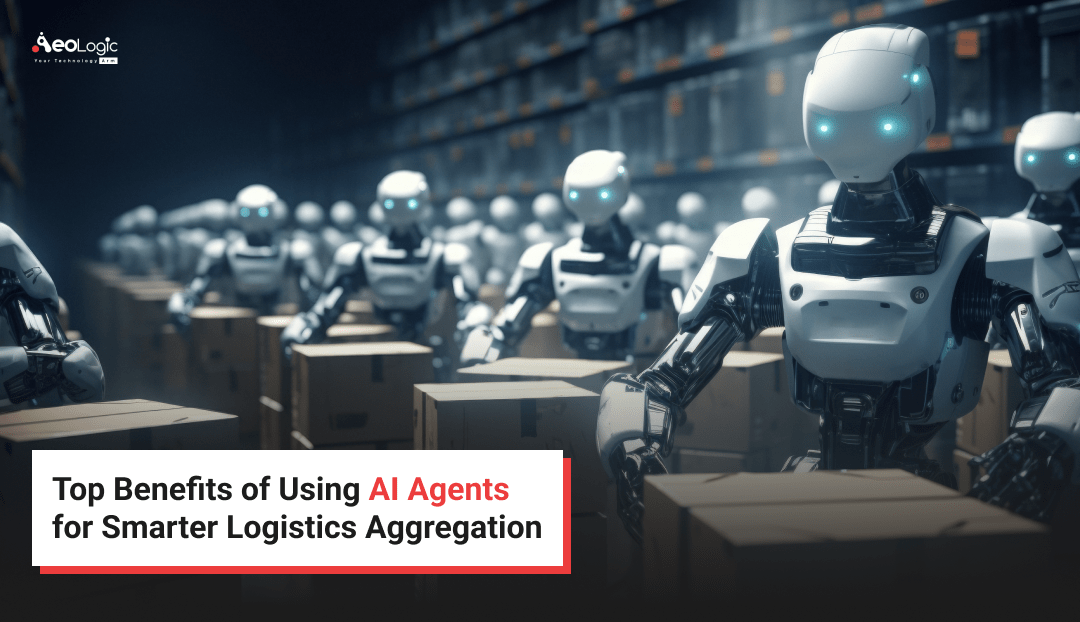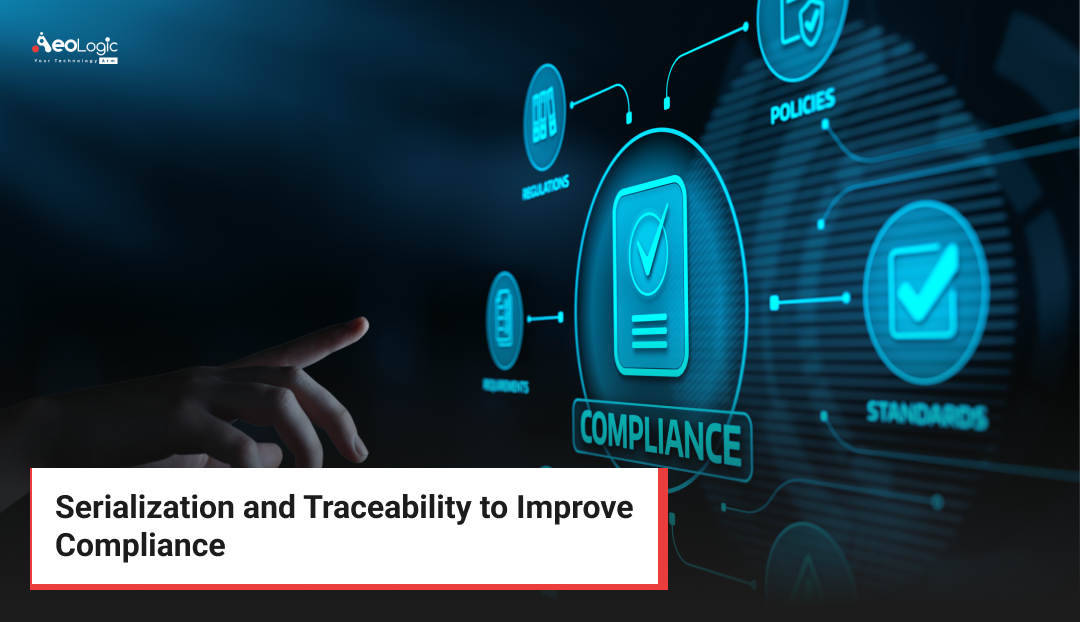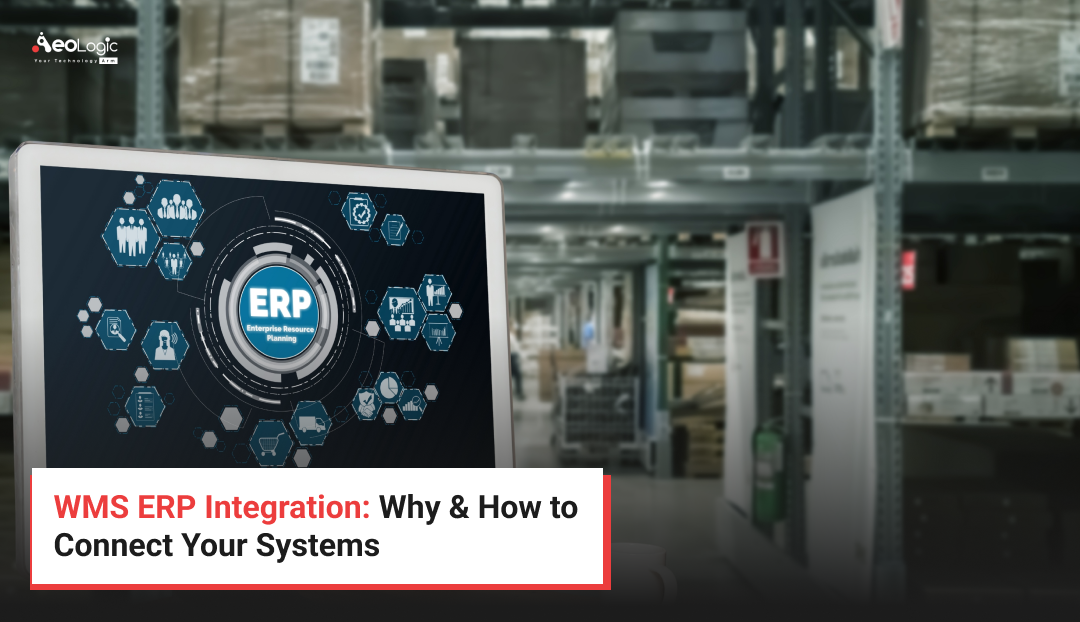Logistics operations are crucial to improving the whole supply chain for businesses. Digital transformation has significantly improved the way logistics operations are managed, thanks to the integration of various smart technologies, which has led to the establishment of smart logistics aggregation.
However, with fluctuating demands and unpredictable disruptions that can affect logistics operations at any time, various problems can arise, including analyzing and managing complex tasks, decision-making, higher operational costs, slower responses, and poor customer experience. All these problems need to be solved to make smart logistic aggregation better than ever before.
The AI agent solutions are doing great in bringing advancements and evolution to logistic aggregation and improving operational efficiency.
Agentic AI provides cutting-edge solutions that have the potential to revolutionize the way logistics firms function. Artificial intelligence (AI) can improve operations and lower the possibility of human error by automating labor procedures. Faster reaction times to shifting circumstances are made possible by this automation, which is essential in a sector that moves quickly. AI agents also offer advanced data analysis, which gives businesses a better understanding of how they operate.
These agentic solutions, which can handle enormous volumes of data, assist businesses in making defensible judgments based on up-to-date information. Logistics companies can quickly adjust to changing market needs and ultimately improve their overall performance thanks to this capability, which also boosts organizational flexibility and operational efficiency.
Key Statistics
The AI agents market size has grown exponentially from $5.68 billion in 2024 to $8.34 billion in 2025 at a compound annual growth rate (CAGR) of 47.0%. It is expected to see exponential growth in the next few years. It will grow to $38.52 billion in 2029 at a compound annual growth rate (CAGR) of 61.4%.
The global logistics market size was estimated at USD 9.98 trillion in 2024 and is predicted to increase from USD 11.23 trillion in 2025 to approximately USD 23.14 trillion by 2034, expanding at a CAGR of 8.36% from 2025 to 2034.
AI agents forecast equipment failures, optimize supply chains, and minimize downtime. Siemens and GE are among the companies leveraging AI to monitor machinery and schedule maintenance in advance of breakdowns. According to McKinsey, AI-powered automation results in a 25% increase in productivity.
Looking for? Top AI Development Companies That Help Businesses Scale
Understanding AI Agents for Smart Logistics Aggregation
AI agents are an innovative form of conventional AI that refers to software solutions to provide automation, data analysis, and more predictive abilities to enhance the various operations, aspects, and factors for the various industries.
The logistics operations are getting a lot of benefits and applications with the AI agent solutions that boost their smart factor in an advanced manner. The AI agents enhance smart logistic aggregation through process optimization, increased efficiency, and improved decision-making.
Automation, data analysis, and predictive skills help them accomplish this, which lowers costs, speeds up delivery, and improves customer happiness.
Also Read: The Role of AI Agents in the Future of Warehouse Automation
Top Benefits of AI Agents for Smarter Logistics Aggregation
There are various top benefits of AI agents for smarter logistics aggregation. Here are a few mentioned below.
Optimized Transportation and Logistics
Transportation and logistics optimization play a crucial role in aggregating smart logistics. The manual methods cannot accurately optimize the processes. The AI agents in logistics enable an analysis of weather, route condition, driver capability, vehicle power, fuel, traffic congestion, and past other data that provide better ideas about the loading, and unloading and provide an accurate delivery time. Also, it offers alternative route options if any type of inefficient occurs on a route.
Increases Flexibility
Continuous improvement with the changing environment plays an important role in bringing innovation to the smart logistics aggregation. Conventional methods and systems are not that capable of making smart logistic systems learn and adapt to changing conditions. The AI agents in logistics can learn the patterns, market trends, and much more. It enables us to make improvements according to the need. The faster and right innovation, the smarter logistics aggregate with the advancements.
We Provide “Generative AI Solutions“
Enhances Supply Chain Visibility
To make logistics operations more efficient and smarter, it requires monitoring the supply chain to avoid any type of disruption. Manually or traditionally methods cannot offer that kind of visibility facility to get accurate results. Where the AI agents in the supply chain can integrate with the IoT. The IoT-powered sensors can collect data and AI algorithms can make analyses to find the defect patterns. This helps to develop quality products and also provides the best methods to load to the logistics operations.
Sustainability
Logistics operations involve various processes like delivery, loading, unloading, packaging, etc that consume resources, energy, and cost. Sometimes it could lead to bad environmental impacts like unnecessary fuel consumption, more energy transfers, and unnecessary labor for a work that takes too much charge. Where the AI agents in logistics make it smart logistics by enabling the system to monitor the energy consumption to limit it. Also, automate the tasks to save labor costs that overall benefit the whole logistic processes.
Reduces Risk and Increases Resilience
To transform or enhance the smart logistic aggregation, it is important to avoid any type of disruption. There could be various kinds of disruptions in the logistics operations that prevent it from being a smart aggregation at the peak. The problems could be delays in delivery, bad packaging, and fraud, which overall affect the logistics. Where AI agents can assist in reducing the risks of delays, disruptions, and even fraud by evaluating data and anticipating possible problems, strengthening the supply chain’s resilience.
Amplifies Customer Experience
AI agents amplify customer satisfaction by providing customers with precise status, location, and tracking information of their orders in near real-time. Customers are aware of their deliveries’ estimated time of arrival, can interact with alert notifications that inform them of delays, and have real-time answers to their queries.
AI solutions can also assist with examining, monitoring, and predicting customer demand and preferences to tailor service and inventory decisions. This personalization will increase trust and loyalty, which is imperative to remaining competitive in the logistics sector.
Augments Inventory Management
Effective inventory management is integral to logistics aggregation. AI agents study historical sales data, seasonal variances, and supply chain disruptions to accurately predict what inventory is required and when. This avoids carrying excess stock (or stockouts) that can tie up warehouse capacity and increase holding costs. AI automation can reorder stock as needed, ensuring that the products tenants want are available when needed.
Facilitates Predictive Maintenance
AI agents will monitor and maintain the health and performance of assets such as vehicles and equipment employed by the logistics sector. They will scan and report based on their sensors to inform continuous assessments, which will elucidate potential future breakdowns ahead of time, scheduling proactive maintenance and avoiding costly repairs and downtime.
This foresight will give continued life to assets, better assist in repairs, and help implement smoother transportation flows. This foresight will allow for decreases in damage repair and will allow for a higher reliability and efficiency in reaching their destinations.
Also Read: How AI Agents Are Improving EHR/EMR Systems in Healthcare
Top Key Use Cases of AI Agents for Smarter Logistics Aggregation
There are some key use cases of AI agents for smarter logistics aggregation. Here are a few mentioned below.
Automated Customer Support
Customer support automation boosts the smarter logistic aggregation of the supply chain. The customers can have various issues related to delivery like time, fees, and methods that need to be resolved. The traditional methods cannot make it solve in real-time as it takes a little bit of delay. Where the AI agents powered system can enable automation to provide solutions to customer queries and make them satisfied with the logistic delivery.
Warehouse Automation
Warehouse automation is a trending thing in logistics operations and provides much flexibility to enable smarter logistic aggregation. The AI agentic solutions can analyze the data and enable various methods to automate. It can enhance operational efficiency in sorting, picking, and packing processes resulting in efficient order delivery. The integration of AI agents and automation of warehousing provides the best way to enhance smarter logistic aggregation.
Vendor Management
Vendor relationships need to be better for better logistic operations enhancement. The better the logistic operations, the more chances of making it smarter with the integration of various technologies. The conventional ways are not too efficient to provide transparency and trust to the vendors. Where the AI-based agentic solutions manage effective relationships and supplier tender performance to procure efficiently by reducing time instabilities and communication barriers.
Human Resource Management
Managing human resources is crucial as it is important to make sure that there is the right number of human work on the specific logistic operations. Without any capable technologies, there could be a chance of wasting human resources. Where AI agents can enhance the optimization and management of human resources by providing services like scheduling, performance monitoring, and interaction to improve workers’ interactions with the company. This boosts smart logistic aggregation.
Also Read: The Benefits of Partnering with An AI Automation Agency
Future Trends in AI Agents for Logistic Operations
There are a few future trends in AI agents for logistic operations that are going to bring advancements. Here are a few key trends mentioned below.
Integration or Interconnection with IoT
AI agentic solutions require better quality data to analyze to enhance decision-making. The manual collecting and storing of data cannot help too much in the future to get the right results. The integration of IoT with AI agentic solutions in the future enables the collection of the right and accurate data to get the best of AI agents.
Hyper-Personalization
Hyper personalization is another key future trend in AI-driven solutions that enhances smarter logistics aggregation. The hyper-personalization enables personalized aspects for the customers, organizations, and delivery partners that overall enhance the efficiency and more customized solutions according to requirements.
Accountable Practices in AI
The growing use of AI in businesses will necessitate more responsible AI, which permits the appropriate use of data in businesses. There are various increased practices in the AI field like advancements of generative AI, machine learning development, and much more that boost the logistics operations efficiency today and also for the upcoming future.
Increases Collaboration
Better collaboration techniques are another key trend that makes various companies, humans, and resources integrate for better advancements and development in the logistics industry. The enhanced collaboration offers smooth and seamless communication across the logistic operations, which could also be the reason for the evolution of smarter logistic aggregation.
Also Read: How AI is Shaping the Future of Warehouse Automation
Final Take
AI agents are revolutionizing, transforming, and advancing smarter logistic aggregation with automation, predictive ability, and better optimization potential. The AI agents can implement logistic operations that enable smarter operations management to boost the efficiency and productivity of the logistics businesses.
Overall, AI agents are not just a technological trend but a crucial tool for building smarter, more efficient, and customer-centric logistics operations. The more logistics businesses adapt to it, the more global development is boosted with the smarter system.
FAQs
Can AI Agents Reduce Costs in Smart Logistics Systems?
Certainly, AI agents can help save a lot of money in smart logistics. AI agents can eliminate or automate other repetitive processes, such as route planning, inventory planning, or demand forecasting, solving a huge unnecessary costs due to human error, or helping optimize human completion of the best use of available resources.
For example, AI algorithms can rapidly analyze real time data to give the fastest delivery time by identifying the best routes, which also helped reduced fuel consumption, labor time, and paying less.
AI agents can also help predict preventative maintenance for vehicles and other equipment, which saves a ton of money, which means unforeseen problems. With AI agents helping to reduce labor in warehouse operations–for example managing inventory by ensuring correct stock levels and practices, they are helping organizations save money on unnecessary storage or their bottom line with excess stock.
Overall, AI smart logistics allows organizations to reduce operational costs, increase efficiency, and customer’s satisfaction.
How Does AI Technology Enhance Supply Chain Management in Logistics Aggregation?
AI technology improves supply chain management by offering real-time visibility, predictive analytics, and intelligent decision-making assistance. In logistics aggregation, AI agents utilize information from suppliers, transporters, and warehouses to provide a single picture.
This enables the organization to anticipate a disruption, to centralize inventory levels and to streamline procurement. Using its machine learning models to consider historic trends and contemporaneous conditions, AI can generate demand forecasts that allow for proactive planning.
Moreover, AI powered automation makes order processing faster and improves coordination between involved parties, helping to enable faster deliveries, decrease delays, and improve supply chain resilience.
Why Should Companies Adopt AI Agents for Smarter Logistics Aggregation?
Businesses should utilize AI agents for logistics aggregation, as these technologies provide unrivaled efficiency, accuracy, and scalability to complex supply chain operations.
AI agents automate data processing and optimize logistics processes, while not immediately needing human intervention and therefore avoiding human error. With the ability to analyze vast amounts of data in seconds, AI agents improve resource allocation through better route planning, inventory management, and demand forecasting.
Utilizing AI agents allows businesses to react quickly to changes in the market, maximize cost savings, and improve consumer service. It is important for businesses operating in an intensely competitive market with shifting consumer preferences to have AI-powered logistics solutions to remain flexible, reduce waste, and maintain an advantage over competitors.

I’m Deepika Pandey, an SEO strategist and content writer with 6+ years of experience. I create SEO-friendly content that drives traffic and engages readers. I combine data insights with creativity to help businesses grow their online presence effectively.







